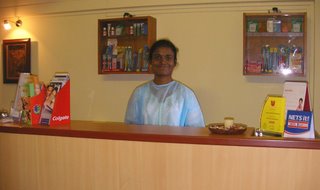For example, at restaurants or shops, I’m used to hearing, “May I help you?” On the telephone, some use a formal expression such as, “How may I be of assistance?” In Singlish, the question is, “What do you want?” Simple. Direct.
Kaori also told me of the prevalence of the use of “can” and “can’t” as verbs. I thought she might be exaggerating. Then, after making an appointment with a dentist (a whole other story), I wanted to change the time of my appointment so called the office and asked, “Would it be all right if I came at 4:30 instead of 4:00.” The response from the receptionist (in the photo) was “4:30 can.” Simple. Direct.

When I was checking out of the Perak Hotel, one of the staff asked me, “Happy?” I was baffled. At first, I thought, I’m generally happy and today, on a scale of 1-10, it would probably be an 8 or 9. Then I realized she might be asking, “Were you happy with your room?” Or it could have been, “Are you enjoying your stay in Singapore?” Because I had no idea how to reply, I just said, “I don’t speak Singlish.”
Singlish would be a good language to learn. If I spoke it with my Japanese students, it would probably make communication easier. Simple. Direct.
No comments:
Post a Comment